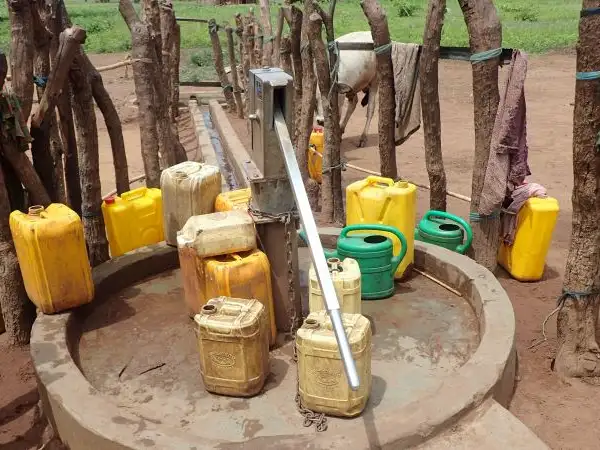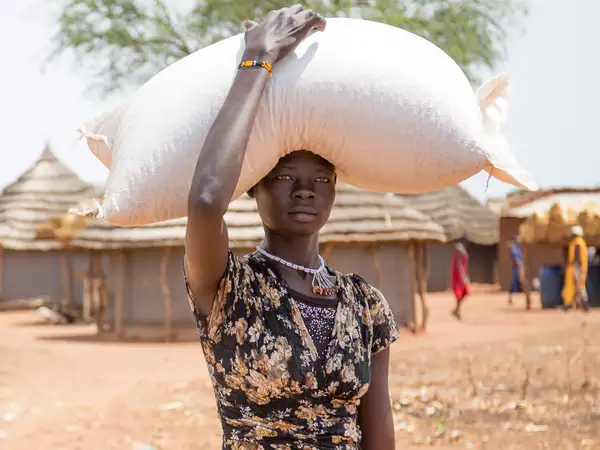

A water pump that has been repaired through the generosity of CAFOD supporters.
South Sudan is facing coronavirus after already enduring years of conflict, ongoing food insecurity and climate challenges.
Our brothers and sisters in South Sudan are now experiencing coronavirus on top of many other pressures. Ibrahim Njuguna, CAFOD’s country representative for South Sudan, explains how your support is making a difference.
What is the current situation in South Sudan?
The most recent peace agreement was signed in 2018 and has largely held, though there are ongoing reports of serious local conflicts.
Not having enough food, or clean water to wash your hands, makes the coronavirus one of many devastating threats to families in South Sudan.
With extreme hunger a more visible and increasing threat than the virus, children go out on the streets to beg for food, despite the danger of the disease spreading. Day and night outside my priest house, people are asking for something to ‘quench their hunger’. It is the poorest, the old, women and children who are paying the price.
How is the South Sudan government responding to coronavirus?
The government in South Sudan has established a national taskforce on Covid-19, with further restrictions recently brought into place:
Social events, religious gatherings and sports have been banned.
Schools and universities are closed apart from for exams.
Many businesses that gather crowds, such as bars, have been told to close.
Restaurants, cafes, and transport remain operational but at reduced capacity.
In the poor communities we work with, families are challenged by the need to continue working to either grow crops or earn money so they can eat, despite the risks of coronavirus.
This is against the backdrop of a fragile healthcare system, that doesn’t cover all people and areas. Clinics and other healthcare providers are at real risk of being completely overwhelmed.


South Sudan has endured years of conflict, suffered a serious food crisis in 2017, and now faces coronavirus.
How is CAFOD responding to coronavirus in South Sudan?
You are supporting local organisations who have on-the-ground expertise to tackle coronavirus and help more families survive.
We are working together to deliver vital hygiene messages via radio, and even via megaphones in hard-to-reach areas. Community groups are translating these messages into local languages so that they can be heard and understood by as many people as possible. Local health volunteers have been trained, who share correct hygiene information.
We’re supporting households that need to isolate with food deliveries, so they don’t need to come out of the household to work to provide food for themselves.
We are also working with women’s groups to protect wives, mothers and girlfriends from the risk of domestic violence during lockdown and working to provide access to counselling and other services
Together we’ve set up handwashing stations in markets, schools and health centres, so communities can keep safe. Hand sanitisers have also been distributed, and households have received soap, buckets for water storage and face masks.
We are also working with women’s groups to protect wives, mothers and girlfriends from the risk of domestic violence during lockdown and working to provide access to counselling and other services.
What has the role of the Church been?
The Church in South Sudan is well respected and is a key partner in peacebuilding work.
Fr James Oyet Latansio, Catholic Priest and General Secretary of the South Sudan Council of Churches, further explains the situation in country, and the impact of coronavirus:
"Communities across South Sudan are facing huge challenges at this time. Ongoing conflict, flooding, and the impact of Covid-19 on health and the economy are all making food needs worse for families. People who live by earning a daily wage were caught unprepared, and the most vulnerable don’t have enough to eat.
"Those who have been displaced, many of whom left their homes at short notice due to conflict or floods, are among the worst affected. They do not have clean water to drink – let alone wash their hands – or food to eat and cannot practise social distancing.
"With extreme hunger a more visible and increasing threat than the virus, children go out on the streets to beg for food, despite the danger of the disease spreading. Day and night outside my priest house, people are asking for something to ‘quench their hunger’. It is the poorest, the old, women and children who are paying the price."
How has your work changed since the outbreak?
Despite the challenges, our lifesaving work needs to continue. We need to continue delivering peacebuilding projects, as well as responding to the immediate needs of communities during this emergency.
We are following advice from the World Health Organization and the government to reduce the numbers of people at training sessions, increasing handwashing, and translating all materials into local languages.
Each year, we operate under the pressure to reach communities before the rainy season comes – road access becomes much harder and families need to have planted by the time the rains come. We are getting seeds to farming families along with emergency food packages and continuing to provide practical training and help so that they can adapt to climate change.

